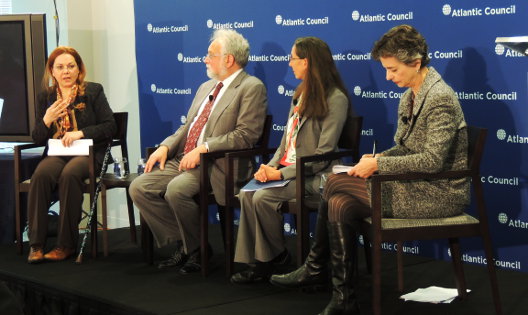 The South Asia Center’s Iran Task Force launched its newest issue brief Iran, Afghanistan and South Asia: Resolving Regional Sources of Instability at an event on November 8. The event featured Fatemeh Aman, president of Global Media Trail and co-author of the issue brief; Laura Jean Palmer-Moloney, a senior research geographer with the US Army Corps of Engineers; and Barnett Rubin, director of the Center for International Cooperation at New York University.
The South Asia Center’s Iran Task Force launched its newest issue brief Iran, Afghanistan and South Asia: Resolving Regional Sources of Instability at an event on November 8. The event featured Fatemeh Aman, president of Global Media Trail and co-author of the issue brief; Laura Jean Palmer-Moloney, a senior research geographer with the US Army Corps of Engineers; and Barnett Rubin, director of the Center for International Cooperation at New York University.
Related ContentDownload and read the issue brief in English and Farsi |
The event primarily focused on Iran’s relationship with Afghanistan, although Iran’s relationships with India and Pakistan were also discussed. Ms. Aman provided an overview of Iran’s relationships with other South Asian countries. Iran and Pakistan have had maintained a mostly cordial relationship. Indian-Iranian relations have warmed in recent years but have been strained by sanctions. Ms. Palmer-Moloney discussed water issues in Afghanistan, all of which have implications for Iran due to water systems which originate in Afghanistan and flow through Iran. Mr. Rubin focused on the security nexus of the United States, Afghanistan, and Iran. He argued that US and Iranian interests in Afghanistan are, in fact, complementary. Mr. Rubin also suggested that US-Iranian relations will have a direct impact on the stability of the next government in Afghanistan.
Iran has strong ties to the rest of South Asia, and retains considerable soft power in Afghanistan in particular. The panelists concluded that successful nuclear talks with Iran could pay dividends in Afghanistan and the rest of South Asia.
